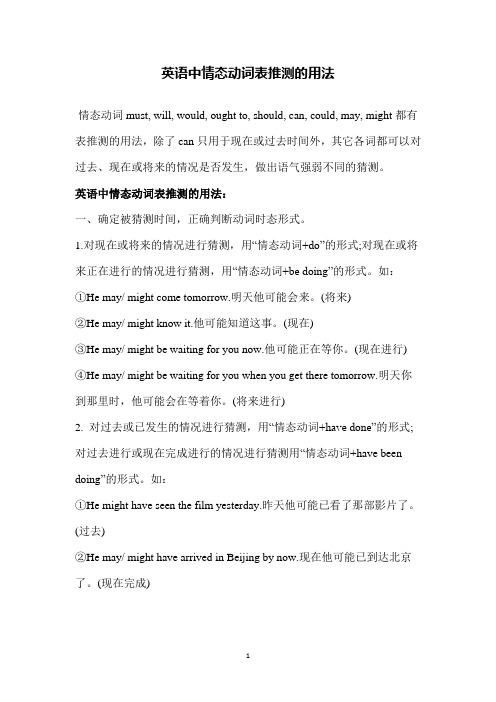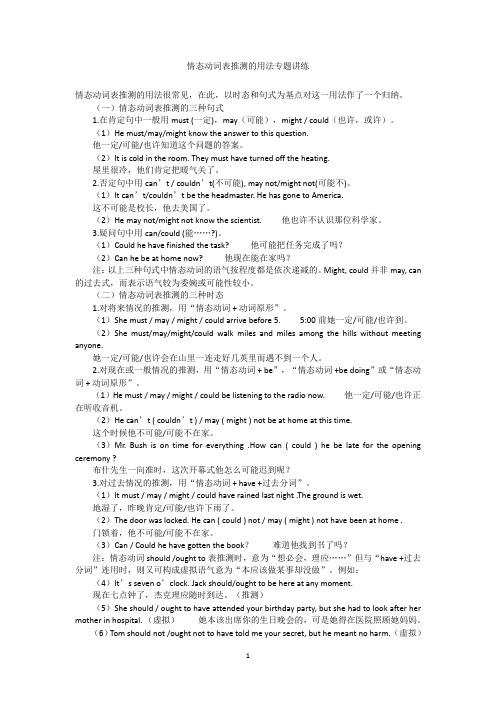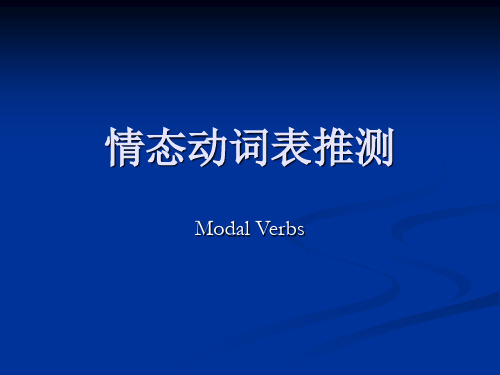情态动词表推测的用法
情态动词表推测的用法

第四页
Shall &should
请求 征求意见
Shall we put off the sport meeting until next week? Shall Tom go there with me tomorrow?
警告
允诺
威胁等
You shall if you don’t work harder.
4.Accident can happen to any drunken driver.
可能性
5.It can’t be my father.He is now in England.
第二页
May &might
1.可能性
He may be very busy now.
He might be very busy now.
第七页
情态动词表示推测
1)might,may
表示主观的推测,
一般用于肯定句
Might------“也许” May------“可能”
否定 否定
Eg:He might be right.他也许是对的。
might not
may not
He may not come tonight.他今晚可能不来
第八页
第十二页
3)need后接完成式主要用于否定句中。
“needn’t + have done ”表示本不必要做某事
Eg: You needn’t have watered the flowers,for it is going to rain.
①--Isn’t that Ann’s husbandபைடு நூலகம்over there?
④---Cathrine,I have cleaned the room for you.
高考英语表推测的情态动词用法小结

英语中有不少情态动词都可以表示推测,其语气有强有弱,表示的可能性有大有小,现将它们的用法归纳如下:1. 接近100%的可能这当然只有must才具有这么高的可能性,它的意思是“一定”“肯定”,所作出的推测几乎接近事实。
如:That hat must be Tom’s. 那帽子一定是汤姆的。
He must be coming by bus. 他一定是乘公共汽车来。
2. 很有可能表示可能性较大的情态动词主要有may should ought to,它们大致相当于汉语的“可能”“应该”“按理会”。
如:She should [ought to] be here soon. 她应该很快就到。
We may be buying a new house. 我们可能要买一座新房子。
3. 一般性的可能在所有表示推测的情态动词中,might和could所表示的可能性最小,由于它们的语气较委婉,较不确定,所以往往相当于汉语的“可能”“也许”“说不定”等。
如:He might be waiting for you. 他可能在等你。
She might not like the idea. 她或许会不赞成这个想法。
We could all be millionaires one day. 我们有一天可能都成为百万富翁。
4. 理论上的可能性表示理论上的可能通常是用can,且可以用于肯定句中。
如:Food poisoning can cause death. 食物中毒可导致死亡。
This kind of thing can happen every now and then. 这种事情是随时可能发生的。
New England can be very hot in September. 新英格兰有时9月份很热。
所谓理论上的可能性,就是指仅从理论上去考虑其可能性,至于实际情况如何,则不作考虑,比如说“食物中毒可导致死亡”,这只是理论上的一种推断,至于某人某次食物中毒了,他是否会死亡,则不在考虑之列,所以说,这种推测是非常“宏观”的!5. 表示对过去情况作推测如果表示对已经发生的情况作推测,不能用“情态动词+动词原形”,也不能用“情态动词的过去式+动词原形”,而是要使用“情态动词+动词完成式”。
情态动词表推测用法总结

情态动词表推测用法总结下面是小编整理的一些关于情态动词表推测用法总结,以供大家学习参考。
一、情态动词can / could用于表推测的用法(1) 从使用句型上看,can 通常只用于否定句或疑问句,一般不用于肯定句,而could 可用于肯定句、否定句和疑问句。
两者没有时间上的差别,只是could 比 can 更委婉,更不确定。
如:It can’t [couldn’t] be true. 那不可能是真的。
What can [could] they be doing? 他们会在干什么呢?We could go there this summer. 今年夏天我们可能要去那儿。
注:can 有时也用于肯定句中表示推测,主要用于表示理论上的可能性(即从理论上看是可能的,但实际未必会发生),或表示“有时”之意。
如:Even experienced teachers can make mistakes. 即使是有经验的教师也可能出错。
She can be very unpleasant. 她有时很令人讨厌。
(2) 从时间关系看,对现在或将来情况作推测,后接动词原形;对正在进行的情况作推测,后接be doing 结构;对过去情况作推测,后接动词完成式。
如:He could have gone home. 他可能已经回家了。
He can’t [couldn’t] have understood. 他不可能理解了。
Why does he know this? Can [Could] someone have told him about it? 他怎么知道? 会是哪个人告诉他了吗?(3) “could+完成式”除表示对过去的推测外,还有以下重要用法:① 表示过去没有实现的可能性,常译为“本来可以”。
如:I could have lent you the money.Why didn’t you ask me? 我本来可以借这笔钱给你的。
情态动词must, can, could, may, might表推测的用法

情态动词must, can, could, may, might表推测的用法:情态动词中的must, can, could, may, might都表推测。
其中must的可能性最大,can / could次之,may / might最小。
具体用法如下:1. must的用法(1)表示推测“可能性”时,意思是“一定、准是”,语气较肯定,较有把握。
He must be American. = It is certain that he is American. 他准是个美国人。
(2)must表推测只能用于肯定句。
如果要表示“一定不、肯定不”的意思时,应用can`t,如询问某种可能时,应用can。
He must know my address. 他肯定知道我的地址。
(一定)He can`t know my address. 他肯定不知道我的地址。
(一定不)Can he know my address? 他知道我的地址吗?(询问可能性)(3)must表示推测时,可以推测现在/正在发生的动作/过去发生的动作。
He must have a car now. (现在)他一定有辆小汽车。
He must be doing his exercises in the classroom.(正在进行)他一定在教室里做练习。
He must have finished the work.(过去发生)他一定已完成了工作。
注:must表示推测时很少用于将来的情况。
一般不用He must come tomorrow.可用It`s certain / I`m sure that he will come tomorrow. (4)在反意疑问句中,当附属部分含有表示推测意义的must时,疑问部分的助动词应与must后面的动词在非推测情况下的用法保持一致。
He must be a worker, isn`t he? (现在)他准时个工人,是吗?It must have rained last night, didn`t it? (过去)昨晚一定下雨了,是不是?You must have learned English for many years, haven`t you? (完成时)你一定学了好多年英语,是吗?2. can / could的用法(1)can表示推测“可能性”时,往往用于否定句或疑问句。
表推测的情态动词用法小结

表推测的情态动词用法小结英语中有不少情态动词都可以表示推测,其语气有强有弱,表示的可能性有大有小,情态动词表推测时,可能性由弱到强的排列顺序如下:might→may→could→can→should →would→must“现将它们的用法归纳如下:1. 接近100%的可能这当然只有must才具有这么高的可能性,它的意思是“一定”“肯定”,所作出的推测几乎接近事实。
如:That hat must be Tom’s. 那帽子一定是汤姆的。
He must be coming by bus. 他一定是乘公共汽车来。
2. 很有可能表示可能性较大的情态动词主要有may, should, ought to,它们大致相当于汉语的“可能”“应该”“按理会”。
如:She should [ought to] be here soon. 她应该很快就到。
We may be buying a new house. 我们可能要买一座新房子。
3. 一般性的可能在所有表示推测的情态动词中,might和could所表示的可能性最小,由于它们的语气较委婉,较不确定,所以往往相当于汉语的“可能”“也许”“说不定”等。
如:He might be waiting for you. 他可能在等你。
She might not like the idea. 她或许会不赞成这个想法。
We could all be millionaires one day. 我们有一天可能都成为百万富翁。
4. 理论上的可能性表示理论上的可能通常是用can,且可以用于肯定句中。
如:Food poisoning can cause death. 食物中毒可导致死亡。
This kind of thing can happen every now and then. 这种事情是随时可能发生的。
New England can be very hot in September. 新英格兰有时9月份很热。
情态动词表推测用法小结1

情态动词(一)表示推测的用法用于肯定的推测:must > can > could > may > might(由强到弱)Must “一定,准是,必然会”。
(Mustn’t不表猜测.)can “可能”。
could “可能”may / might “可能,或许”。
用于否定的推测can’t >couldn’t> may not > might not(由强到弱)can’t“不可能,一定不(是)”。
He be here because she is in hospital.2)couldn’t “不可能,一定不(是)”now.3). may not/ might not “可能/或许不”。
It’sstill early. He may/might not come back. 用于疑问句的推测,一般只用can/could Who can it be at the door? Can it be Tom?推测现在/正在发生的动作/过去发生的动作。
a.推测现在的情况:情态动词+动词原形He must have a car now.他现在一定有辆小汽车。
He can`t be at home.他一定不在家。
He may / might be American.他可能是个美国人。
b.推测现在正在发生的动作:情态动词+ be doing问句形式:情态动词+sb. be doing---?He must be doing his exercises in the classroom.他一定在教室里做练习。
They can`t be reading in the library.他们一定不在图书馆读书。
He may / might be sleeping now.(现在)他可能正在睡觉。
The boy may / might not be watching TV at home.(现在)这个男孩可能没在家看电视.c.推测过去发生的动作:“情态动词+have done/been. 但不用于“mustn't have done/been.”形式。
英语中情态动词表推测的用法

英语中情态动词表推测的用法情态动词must, will, would, ought to, should, can, could, may, might都有表推测的用法,除了can只用于现在或过去时间外,其它各词都可以对过去、现在或将来的情况是否发生,做出语气强弱不同的猜测。
英语中情态动词表推测的用法:一、确定被猜测时间,正确判断动词时态形式。
1.对现在或将来的情况进行猜测,用“情态动词+do”的形式;对现在或将来正在进行的情况进行猜测,用“情态动词+be doing”的形式。
如:①He may/ might come tomorrow.明天他可能会来。
(将来)②He may/ might know it.他可能知道这事。
(现在)③He may/ might be waiting for you now.他可能正在等你。
(现在进行)④He may/ might be waiting for you when you get there tomorrow.明天你到那里时,他可能会在等着你。
(将来进行)2. 对过去或已发生的情况进行猜测,用“情态动词+have done”的形式;对过去进行或现在完成进行的情况进行猜测用“情态动词+have been doing”的形式。
如:①He might have seen the film yesterday.昨天他可能已看了那部影片了。
(过去)②He may/ might have arrived in Beijing by now.现在他可能已到达北京了。
(现在完成)③He might have been waiting for you when you phoned him.你给他打电话时,他可能已在等你了。
(过去完成进行)二、把握猜测语气特点,选择恰当情态动词。
1. 熟记情态动词的语气特点和用法限制。
1)表示肯定的猜测时,各情态动词语气强弱如下:最强——must(一定)will (很有可能)would(很有可能)ought to(应该,很有可能)should(应该,很有可能)can(可能)could(可能)may(可能)最弱——might(可能)2)表示否定的猜测时can't / couldn't语气最强,指“不可能”;may / might not语气最弱,意思是“可能不”。
情态动词表示推测的用法

情态动词表推测的用法专题讲练情态动词表推测的用法很常见,在此,以时态和句式为基点对这一用法作了一个归纳。
(一)情态动词表推测的三种句式1.在肯定句中一般用must (一定),may(可能),might / could(也许,或许)。
(1)He must/may/might know the answer to this question.他一定/可能/也许知道这个问题的答案。
(2)It is cold in the room. They must have turned off the heating.屋里很冷,他们肯定把暖气关了。
2.否定句中用can’t / couldn’t(不可能), may not/might not(可能不)。
(1)It can’t/couldn’t be the headmaster. He has gone to America.这不可能是校长,他去美国了。
(2)He may not/might not know the scientist. 他也许不认识那位科学家。
3.疑问句中用can/could (能……?)。
(1)Could he have finished the task? 他可能把任务完成了吗?(2)Can he be at home now? 他现在能在家吗?注:以上三种句式中情态动词的语气按程度都是依次递减的。
Might, could并非may, can 的过去式,而表示语气较为委婉或可能性较小。
(二)情态动词表推测的三种时态1.对将来情况的推测,用“情态动词 + 动词原形”。
(1)She must / may / might / could arrive before 5. 5:00前她一定/可能/也许到。
(2)She must/may/might/could walk miles and miles among the hills without meeting anyone.她一定/可能/也许会在山里一连走好几英里而遇不到一个人。
情态动词must。can。could。may。might表推测的用法

情态动词must。
can。
could。
may。
might表推测的用法情态动词can / could表示推测时,意思是“可能、有可能”,语气比must弱。
XXX用于现在和将来,could用于过去。
1)表示可能性时,can / could后面接动词原形。
He canbe American。
= It is possible that he is American.他可能是个美国人。
2)表示不可能性时,用XXX。
He can`t be American。
=It is impossible that he is American.他不可能是个美国人。
3)can / could还可以表示“会、能够”的意思。
He can speak Chinese.他会说中文。
4)在疑问句中,XXX表示请求、允许、建议等意义。
Can you help me?你能帮我吗?Could you please pass me the salt?你能把盐递给我吗?3.may / might的用法1)may / might表示推测时,意思是“可能性很小”,语气比can / could更弱。
He may be American。
= It is possible thathe is American。
but the possibility is small.他可能是个美国人,但可能性很小。
2)may / might还可以表示请求、许可、建议等意义。
May I use your phone?我可以用你的电话吗?Might I suggest a different approach?我可以建议一种不同的方法吗?3)在虚拟语气中,XXX表示“可能性很小,甚至不可能”,表示一种假设的情况。
If I had studied harder。
I might have passed the exam.如果我学得更努力,我可能会通过考试。
总之,情态动词must。
【高中英语】多角度阐述情态动词表推测的用法

【高中英语】多角度阐述情态动词表推测的用法情态动词在历年的高考测试中既是高考热点,也是高考难点。
在高考中,除了对情态动词的基本意义和用法进行考查外,还加强了对具有相同功能、意思相近的情态动词用法的考查,尤其情态动词表推测的用法是此部分的重要考点,也是学生在高考中的高分瓶颈。
下面,我们就情态动词表推测的用法从不同角度结合高考试题进行分析,以帮助考生突破此难点。
首先,通常用来推断这种用法的情态动词有must、can-can、may、may和should。
候选人可以从三个角度分析他们的差异。
第一,从不同的句式来分析情态动词对事实的推测。
Lmust只用于肯定句,意思是“必须,必须”。
lcan,could用于否定句和疑问句,意为“根本不可能,想必不会”。
注:can在肯定句中表示理论上的可能性(暂时的可能性)。
1.ahouseinthecenteroflondoncancostalotofmoney.2.参加球赛令人兴奋。
lshould既可用于肯定句,也可用于否定句,意为“按理应该”。
may,may可以用在肯定句和否定句中。
1.youhaveworkedhardallday.youmustbetired.(肯定句)2.此时此刻,我们的老师必须纠正我们的错误。
(垦丁句)3.iftomdidn’tleavehereuntilfiveo’clock,hecan’tbehomeyet.(否定句)4.我不知道她在哪里。
(垦丁句)5.ihaveboughtadozenofbeer.thatshouldbeenough.(肯定句)6--有人敲门。
---whocanitbe?(疑问句)其次,从语气强度的角度分析情态动词表推测的差异。
他们的语气由强到弱依次如下Lmust的语调最为强烈,表明了一种肯定而积极的猜测。
lcan’t语气最强,表示有把握的否定推测,也可把它看成must的否定结构。
做不到比做不到弱。
lshould语气较must弱,表示估计或推测上的“应该”,还可以翻译成“可能,该,估计,按理应当”等等。
情态动词“推测”用法秀

情态动词“推测”用法秀表示推测的情态动词有must, should, can, could, may, might等。
它们在表示推测的时候用来说明说话者的主观看法。
为了便于读者更好地掌握它们的用法,笔者从以下面七个方面来进行总结。
一、从词义上理解表示肯定的猜测时,must意为“准是,一定”;should意为“按理应该”;can/could 意为“有时可能会”;may/might意为“也许,可能”;表示否定推测时,can’t意为“不可能”,may/might not意为“可能不”。
二、从句式上理解情态动词表示推测时有三种句式:肯定句;否定句和疑问句●肯定句中一般用must, should, can, could, may, might表推测。
如:You haven’t eaten anything since this morning; you must be hungry.从早晨以来你就没吃东西,你肯定饿了。
Three weeks should be enough. 三个星期应该够了吧。
Smoking can cause cancer. 吸烟有可能引起癌症。
I could come tomorrow. 我明天可以来。
Don’t play with the knife. You may cut yourself.不要玩刀,你可能会伤了自己。
Anything could/might happen if you don’t obey the rule.如果你不遵守规则的话,任何事都可能发生。
●否定句中用can / could not, may/ might not表推测。
如:否定推测分为两种情况:1)语气不很肯定时,常用may/might not,意为“可能不、也许不”。
如:He may / might not be at home. 他可能不在家。
2)否定语气很强时,则用can’t,意为“根本不可能、想必不会”,表示惊讶、怀疑的感情色彩。
表推测的情态动词

3. “can/could not +have +done”“过 去 不可能做了某事” 她不能去你家,她不知道你的地址。 eg. She can not have been to your house;she does not know your address.
4. may/might have done“过去或许做 过某事” may/might not have done “过去或 许 没有做过某事” eg. I can’t find my key, I might have left it at home. He might not have got your letter.
二.“情态动词+have done” 的用法。 1.must have done “过去一定做了某事” 表示对过去的一种肯定性推测。 eg. She must have gone by bus. It must have rained last night, for the road is quite muddy.
2. can/could have+done“过去可能 做了某事”, “could have+done”也可表示‘‘过 去本可以做某事但实际上却没有做” eg. He was not at home last night, he could have gone to the cinema. I could have finished my homework last night, but I was too sleepy.
5.ought to/should have done,”表示本应该 做某事,而事实上并没有做”。 否定句表示“ 本不该做某事而实际上做 了”。 你在实验中本应该更仔细些的 You ought to/should have been more careful in this experiment. 他不应该把那些旧衣服扔了。 He ought not to have thrown the old clothes away.
表推测的情态动词用法小结

表推测的情态动词用法小结英语中有不少情态动词都可以表示推测,其语气有强有弱,表示的可能性有大有小,现将它们的用法归纳如下:1. 接近100%的可能这当然只有must才具有这么高的可能性,它的意思是“一定”“肯定”,所作出的推测几乎接近事实。
如:That hat must be Tom’s. 那帽子一定是汤姆的。
He must be coming by bus. 他一定是乘公共汽车来。
2. 很有可能表示可能性较大的情态动词主要有may, should, ought to,它们大致相当于汉语的“可能”“应该”“按理会”。
如:She should [ought to] be here soon. 她应该很快就到。
We may be buying a new house. 我们可能要买一座新房子。
3. 一般性的可能在所有表示推测的情态动词中,might和could所表示的可能性最小,由于它们的语气较委婉,较不确定,所以往往相当于汉语的“可能”“也许”“说不定”等。
如:He might be waiting for you. 他可能在等你。
She might not like the idea. 她或许会不赞成这个想法。
We could all be millionaires one day. 我们有一天可能都成为百万富翁。
4. 理论上的可能性表示理论上的可能通常是用can,且可以用于肯定句中。
如:Food poisoning can cause death. 食物中毒可导致死亡。
This kind of thing can happen every now and then. 这种事情是随时可能发生的。
New England can be very hot in September. 新英格兰有时9月份很热。
所谓理论上的可能性,就是指仅从理论上去考虑其可能性,至于实际情况如何,则不作考虑,比如说“食物中毒可导致死亡”,这只是理论上的一种推断,至于某人某次食物中毒了,他是否会死亡,则不在考虑之列,所以说,这种推测是非常“宏观”的!5. 表示对过去情况作推测如果表示对已经发生的情况作推测,不能用“情态动词+动词原形”,也不能用“情态动词的过去式+动词原形”,而是要使用“情态动词+动词完成式”。
表推测的情态动词用法小结含练习与答案

表推测的情态动词用法小结英语中有不少情态动词都可以表示推测,其语气有强有弱,表示的可能性有大有小,现将它们的用法归纳如下:1. 接近100%的可能这当然只有must才具有这么高的可能性,它的意思是“一定”“肯定”,所作出的推测几乎接近事实。
如:That hat must be Tom’s.那帽子一定是汤姆的。
He must be coming by bus. 他一定是乘公共汽车来。
2. 很有可能表示可能性较大的情态动词主要有may, should, ought to,它们大致相当于汉语的“可能”“应该”“按理会”。
如:She should [ought to] be here soon. 她应该很快就到。
We may be buying a new house. 我们可能要买一座新房子。
3. 一般性的可能在所有表示推测的情态动词中,might和could所表示的可能性最小,由于它们的语气较委婉,较不确定,所以往往相当于汉语的“可能”“也许”“说不定”等。
如:He might be waiting for you. 他可能在等你。
We could all be millionaires one day. 我们有一天可能都成为百万富翁。
4. 理论上的可能性表示理论上的可能通常是用can,且可以用于肯定句中。
如:Food poisoning can cause death. 食物中毒可导致死亡。
This kind of thing can happen every now and then. 这种事情是随时可能发生的。
所谓理论上的可能性,就是指仅从理论上去考虑其可能性,至于实际情况如何,则不作考虑,比如说“食物中毒可导致死亡”,这只是理论上的一种推断,至于某人某次食物中毒了,他是否会死亡,则不在考虑之列,所以说,这种推测是非常“宏观”的!5. 表示对过去情况作推测如果表示对已经发生的情况作推测,不能用“情态动词+动词原形”,也不能用“情态动词的过去式+动词原形”,而是要使用“情态动词+动词完成式”。
情态动词表推测

______ be at home. can’t 4. --Is this Lan Qiang’s boxing glove? --Is --Yes, it must be his. This’s his name on the back. --Yes, ____ may/might/could 5. You’d better take an umbrella. It ______________ rain this afternoon. must 6. It’s the library! So you ____ know shouting is not allowed here. 7. --Have you decided where to spend your summer --Have holiay? ma --Not yet. We ____ go to Qingdao. --Not y us a speech this evening? 8. --Is Jessica giving --Is --No, it can’t be her. She has been to Japan. --No, ____
9. --What will the weather be like tomorrow? --What --It _____ be rainy, cloudy or sunny. Who knows? --It might must 10. You _____ be tired after playing sports for a long time without a rest. 11. --Can I tell Peter about the news? --Can --No, I don’t want anyone else to know it. You --No, don’ must ____ keep it to yourself. 12. --Marry, I have cleaned the room for you. --Marry, --Thank you. Youneedn’t have --Thank ______________ it. I could manage it myself. done
- 1、下载文档前请自行甄别文档内容的完整性,平台不提供额外的编辑、内容补充、找答案等附加服务。
- 2、"仅部分预览"的文档,不可在线预览部分如存在完整性等问题,可反馈申请退款(可完整预览的文档不适用该条件!)。
- 3、如文档侵犯您的权益,请联系客服反馈,我们会尽快为您处理(人工客服工作时间:9:00-18:30)。
命令,警告等(第二/三人称) Should表劝告,建议,命令及合理推断
⑸Must&can’t
must
“命令”,“推测” A,规定,指定 B,主观的命令,禁止 C,猜测,(语气肯定)
Can’t用于否定句
情态动词表示推测
1)might,may
表示主观的推测, 一般用于肯定句
Might------“也许” May------“可能” 否定 否定
⑨If
you are planing to spend your money having fun this week, better it------you’ve got some big bills coming. A. forget B.forgot C.forgetting D.to forget
可能性
5.It can’t be my father.He is now in England.
May &might
1.可能性
He may be very busy now. He might be very busy now.
May表许可-------
He may go now. May I go now?
⑤He
paid for a seat,when he A.Could B.would C.must
⑥To
have entered free. D.need
enjoy the scenery ,Irene would rather spend long hours on the train travl by air. A.As B.to C.than D.while
Can &could
表能力
表请求,许可
1.My grandma is over eighty,but she can read without glasses. 2.Can you wait a moment please? 3.Excuse me,coule you help me please? 4.Accident can happen to any drunken driver.
祈使句-------
May you succeed! May you have a nice trip!
Will &would
意志, 愿望, 决心
That bag looks heavy.I’ll help you with it.
Thanks for lending me money.I’ll pay you back on Friday.
表主观的推测“一定”,语气十分肯定。其否定式为can’t“不可 能”,不用mustn’t, mustn’t表示禁止,不允许,语气十分强硬。
Eg:He must be in the classroom now. You can’t have known the truth. Students mustn’t smoke.
★一些情态动词后接完成式是对过去情况的肯定或否定的推测或推断
must have done sth may have done sth might have done sth can’t have done sth may not have done sth might not have done sth
have completed his work;otherwise ,he wouldn’t be enjoying himself by the seaside. B.must C.wouldn’t D.can’t
A.Should
③--Excuse
me.Is that the right way to the Summer Palace? ---Sorry,I am not sure.But it be. A.Might B.will C.must D.can
3)Should 和ought to
表示根据常规、事理、经验做出的判断,“想必”“应该”。
Eg:Today is Sunday. Our teacher should be at home. That ought to be enough food for the four of us. 4)must
2)“should/ought to +have done”本应该做,本应该发生 “should/ought to +have done”本应该做,本应该发生
Eg:I ought to have said it to her in a calmer mood. He shouldn’t have broken the red light.
3)need后接完成式主要用于否定句中。 “needn’t + have done ”表示本不必要做某事 Eg: You needn’t have watered the flowers,for it is going to rain.
①--Isn’t
No,it A.can’t
②He
that Ann’s husband over there? be him----I’m sure he doesn’t wear glasses. B.must not C.won’t D.may not
警告 允诺 威胁等
He shall have the book when in finish reading it.
Must&can’t
规定、指令 You must have a passport if you want to go abord. You can go out with your friend but you must come back before 11 at night.
★还有一些情态动词后接完成式表示动作按理应在过去发生,但事实上却没有发生。
1)“could +have done sth” “本可能/本可以 做某事” couldn’t +have done sth “本不可能/本不可以 做某事”
Eg :He
thought a ticket when he could have entered free. I didn’t see her in the meeting room this morning.She couldn’t have spoken at the meeting
⑦----Lucy
----She A.can’t
⑧---Who
doesn’t mind lending you her dictionary. . I’ve already borrowed one. B.mustn’t C.needn’t D.shouldn’t
is the girl standing over there? ----Well ,if you know ,her name is Mabel. A. may B.can C.must D.shall
might not may not
Eg:He
might be right.他也许是对的。
He may not come tonight.他今晚可能不来
2)can Can 用于主观推测时,常用于否定句(can’t不可能)和疑问句,
疑问句中也可以用could Can用于肯定句时,表示一时的,客观的可能性。
习惯
请求 (用于第二人称)
Shall &should
Shall we put off the sport meeting until next week?
请求 征求意见
Shall Tom go there with me tomorrow? You shall if you don’t work harder.
Eg:----Can
he be at home now? 他现在在家吗? ---No,he can’t be at home,since I met him in the street just now.
不,他不可能在家,因为我刚才才大街上遇到他了。
Could she be chatting on the internet? 她现在可能在网上聊天吗?
④---Cathrine,I
have cleaned the room for you. ---Thanks.You it.I could manage it myself. A.needn’t to B.needn’t have done C.mustn’t do D.shouldn’t have done
主观的命令、禁止
You must be ill.I can see it from your face.
推测
He can’t be at home.I saw him in the classroom just now.
⑴Can &could ①表能力(ability) ②表请求&允许(request &permission) ③可能性(possibility)
This old man is strange.He will sit for hours without saying anything. We would sit around Grandpa after supper,listening to his stories. Will you come this way,please? Would you open the window?
⑵May&might
①表示可能性,might不是may的过去式; Can用于肯定,理论上“可能” ② may表许可(permission) ③May用于祈使句,表祝愿
Can’t用于否定句中,主观猜测 ⑷Shall和should Shall的用法 征求意见(第一/三人称)
